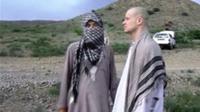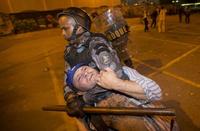-
ISIS insurgents take over Iraq’s largest refinery, continue advance toward Baghdad
Earlier this morning (Wednesday) ISIS Islamic militants took over Iraq’s biggest oil refinery, located near the town of Baiji, 130 miles north of Baghdad. The fall of the refinery is a major blow to the already-reeling government of Nouri al-Maliki. The refinery provides about 40 percent of Iraq’s refined oil needs, and if the supplies dry up, the Iraqi economy would be paralyzed within a few days, and Iraqi citizens would be without power or gas for their cars. As was the case since the ISIS campaign began late last week, the Iraqi military and security forces put up only a token resistance, with most of their units melting away and leaving their arms and equipment behind without even engaging the militants. Iraq is the second largest oil producer in OPEC.
-
-
Iraqis want to know the reasons for army’s rapid collapse
One of the more puzzling questions raised by the ease – and speed – with which a rag-tag group of Islamist insurgents gained control over about one-third of Iraqi territory is this: What happened to the Iraqi army that caused it to collapse in less than three days – three days in which, in any event, it hardly engaged in any fighting? What brought the curtain down on a force in which the United States had invested billions of dollars, a force which, according to two American administrations, was the best trained and armed military force in the Arab world? There are those in Iraq who believe the answers lie not in the military but rather in the political realm.
-
-
Badly engineered missile defense systems deployed “because there was a rush”
In 1983 President Ronald Reagan launched the Strategic Defense Initiative (SDI) to build space- and ground-based missile defense systems. The space-based component was abandoned as impractical, and the focus shifted to Ground-based Midcourse Defense systems (GMD). Despite disappointing results and program test failures, Congress and the George W. Bush administration pressed forward with spending billions on acquiring systems of questionable reliability. “We recognize the problems we have had with all the currently fielded interceptors,” Undersecretary of Defense Frank Kendall old an industry gathering in February 2014. “The root cause was a desire to field these things very quickly and very cheaply; we are seeing a lot of bad engineering, frankly, and it was because there was a rush.”
-
-
A first: San Francisco to feature encrypted Wi-Fi service
The Chief Information Officer (CIO) for the city of San Francisco has announced that the city will implement a small, free Wi-Fi spot within the city which will offer encrypted service and, it is hoped, usher in a new standard for other urban centers.
-
-
If Nouri al-Maliki stays in office, Iraq faces destructive descent into a long civil war
Throughout his two previous terms, Nouri al-Maliki managed to create various problems but failed to solve any of them. Instead of winning over the population of the heavily Sunni provinces, and through them Iraq’s wider Sunni community, al-Maliki’s Shiite-dominated government persistently alienated and discriminated against them. Before long, Sunni areas started to see protests, sit-ins and demonstrations against the policies of al-Maliki and his government. The prime minister’s response was to increase the presence of security and military forces, which were mainly staffed and headed by Shiite personnel. Thanks to his unwillingness to concede to the demands of the Sunni-majority provinces, instead resorting to the use of force, his struggle against the leaders of these provinces (and indeed most opposition Sunni leaders) reached the point of no return. Al-Maliki’s departure, and the formation of a government of national unity of technocrats that could put an end to corruption and at least restore basic services, could perhaps offer a chance for some stability. It would also help end the many disputes and problems al-Maliki has created with the Kurdish regional government, the Sunni provinces, and especially with his own Shiite coalition partners. His insistence on remaining in office will only hasten the start of a destructive and prolonged civil conflict — all too reminiscent of the catastrophe still unfolding across his country’s north-eastern border.
-
-
Pentagon is capable of tracking the Taliban 5 freed from Guantanamo: experts

Critics of the White House’s release of five Taliban prisoners (Taliban 5) from Guantanamo Bay to Qatar are concerned that the group will eventually return to the battlefield in Afghanistan, posing a threat to American forces. Secretary of State John Kerry has said that doing so will open the terrorists to possible drone strikes; but that requires knowledge of their whereabouts. How might intelligence analysts track the Taliban 5 during and after their stay in Qatar? Experts say that the Pentagon is capable of tracking the former detainees using algorithms that predict terrorists’ movements based on their personal history and network.
-
-
Terror court case in U.K. continues to be held in secret, alarming critics
A major terrorism trial in the United Kingdom has also become a media cause célèbre as media representatives challenge senior judges, leading to a case which is both mysterious and well known. That came after the Crown Prosecution Service (CSP) had persuaded the case judge that the entire trial should take place in secret. No further reasons for the case have been made public, and it still remains uncertain whether the full trial will be reportable.
-
-
How has Iraq lost a third of its territory to ISIS in three days?

The Islamic State of Iraq and the Levant (ISIL), also known as ISIS, has about 12,000 fighters in its ranks. About 8,000 needed only forty-eight hours to take Mosul, Iraq’s second largest city, although it was defended by more than 27,000 government troops. It took ISIL another twenty-four hours to gain control of about one-third of Iraq – facing little, if any, resistance from Iraq’s one-million-strong security apparatus. The reasons: After the U.S. occupation force, in 2003, dismantled Iraq’s professional military, a new Iraqi army was re-established from militia members and low-ranking members of the Ba’ath army. Senior officers in Saddam Hussein’s forces were dismissed, which gave rise to at least two security issues. Firstly, military officers of the previous army were steered toward terrorist groups. Secondly, Iraq’s new military suffered from the loss of expertise and military discipline instilled by their former officers. In addition, poor governance has led to widespread corruption in both political and military spheres. Military personnel are routinely reported to be soliciting bribes, especially in Sunni areas of Iraq.
-
-
New approach to balancing security and privacy
Online identification and authentication keeps transactions secure on the Internet, but this also has implications for your privacy. Disclosing more personal information than needed online when, say, you log in to your bank Web site may simplify the bank’s security at the cost of your privacy. Now, thanks to research by the EU-funded project Attribute-based Credentials for Trust, or ABC4Trust, there is a new approach that keeps systems secure and protects your identity.
-
-
U.S. begins evacuation of Baghdad embassy; Iranian general coordinating the defense of Baghdad
The State Department yesterday (Sunday) that non-essential employees at the U.S. embassy in Baghdad were being evacuated, but that the United States would remain “fully equipped to carry out its national security mission.” The Pentagon has ordered an aircraft carrier and two missile-carrying ships to the Persian Gulf, hinting at the possibility of imminent U.S. air strikes against the advancing Sunni insurgents. The Sunni insurgents who now control about a third of Iraq said Sunday that they had executed 1,700 Iraqi soldiers, stressing that all those who killed were Shi’as. Iran had sent 2,000 advance troops to Baghdad, and General Qassem Suleimani, the commander of the Qods Force of Iran’s Revolutionary Guard, is coordinating the defense of Baghdad.
-
-
Number of structurally deficient bridges in U.S. declines

The number of structurally deficient bridges in the United States has declined by 14 percent in the last six years, but despite the improvement, 10 percent of American bridges are in need of maintenance, rehabilitation, or replacement. The average age of bridges in the country is forty-three years old, and most bridges were built to last for fifty-years, so eventually all bridges will become structurally deficient unless they are repaired or replaced.
-
-
S.D. high on the list of recipients of DHS funds, even as it faces “no specific or domestic terrorist threat”
Following the 9/11 terrorist attacks, DHS has established an office in each state which oversees millions of dollars in federal grant and aid money for security related measures. Groups monitoring the DHS allocation of funds to states note the large amount of money allocated to South Dakota, despite the fact that the state is considered by intelligence agencies and officials to be one of fifteen states that have “no specific or domestic terrorist threat.”
-
-
World Cup security teams focus more on crime, protests – less on terrorism

During the 2014 FIFA World Cup, currently being held across twelve different venues across Brazil, security teams have extensively prepared for measures to be taken against crime and protest related to heated political unrest. American bomb-busting robots, Israeli surveillance drones, and German anti-aircraft tanks — an international assortment of security officials and measures – are just some of the pieces of the greater security apparatus protecting both players and fans.
-
-
Administration’s $5 billion counterterrorism (CT) fund met with questions, uncertainty
The White House’s proposed $5 billion counterterrorism (CT) fund designed to help U.S. officials train and equip allied countries to eliminate elements of al-Qaeda or organized terrorism. Some lawmakers and officials familiar with the issue are unsure whether the funds would be directed toward Syrian rebels, or distributed among African countries. Others are worried that the program may interfere with other initiatives meant to accomplish similar objectives.
-
-
Digital birth card to help Kenya fight terrorist infiltration
The influx of immigrants from neighboring African states includes Islamic militants, some belonging to terrorist group al-Shabaab. Maintaining proper records of every Kenyan and immigrant will offer authorities leads on who is in the country and potentially a threat to national security. Some suggests the adoption of a Digital Birth Card (DBC) as a way to curb Kenya’s terrorism fears.
-
More headlines
The long view
Factories First: Winning the Drone War Before It Starts
Wars are won by factories before they are won on the battlefield,Martin C. Feldmann writes, noting that the United States lacks the manufacturing depth for the coming drone age. Rectifying this situation “will take far more than procurement tweaks,” Feldmann writes. “It demands a national-level, wartime-scale industrial mobilization.”
No Nation Is an Island: The Dangers of Modern U.S. Isolationism
The resurgence of isolationist sentiment in American politics is understandable but misguided. While the desire to refocus on domestic renewal is justified, retreating from the world will not bring the security, prosperity, or sovereignty that its proponents promise. On the contrary, it invites instability, diminishes U.S. influence, and erodes the democratic order the U.S. helped forge.
Fragmented by Design: USAID’s Dismantling and the Future of American Foreign Aid
The Trump administration launched an aggressive restructuring of U.S. foreign aid, effectively dismantling the United States Agency for International Development (USAID). The humanitarian and geopolitical fallout of the demise of USAID includes shuttered clinics, destroyed food aid, and China’s growing influence in the global south. This new era of American soft power will determine how, and whether, the U.S. continues to lead in global development.
Water Wars: A Historic Agreement Between Mexico and US Is Ramping Up Border Tension
As climate change drives rising temperatures and changes in rainfall, Mexico and the US are in the middle of a conflict over water, putting an additional strain on their relationship. Partly due to constant droughts, Mexico has struggled to maintain its water deliveries for much of the last 25 years, deliveries to which it is obligated by a 1944 water-sharing agreement between the two countries.
How Disastrous Was the Trump-Putin Meeting?
In Alaska, Trump got played by Putin. Therefore, Steven Pifer writes, the European leaders and Zelensky have to “diplomatically offer suggestions to walk Trump back from a position that he does not appear to understand would be bad for Ukraine, bad for Europe, and bad for American interests. And they have to do so without setting off an explosion that could disrupt U.S.-Ukrainian and U.S.-European relations—all to the delight of Putin and the Kremlin.”
How Male Grievance Fuels Radicalization and Extremist Violence
Social extremism is evolving in reach and form. While traditional racial supremacy ideologies remain, contemporary movements are now often fueled by something more personal and emotionally resonant: male grievance.
